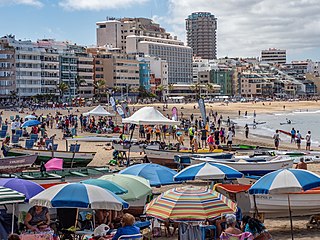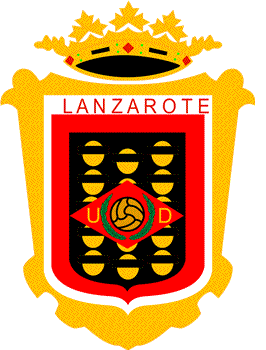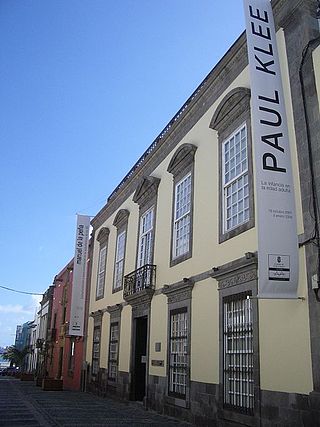
The Canary Islands, also known informally as the Canaries, are a Spanish region, autonomous community and archipelago in the Atlantic Ocean. At their closest point to the African mainland, they are 100 kilometres west of Morocco and the Western Sahara. They are the southernmost of the autonomous communities of Spain. The islands have a population of 2.2 million people and are the most populous special territory of the European Union.

Las Palmas, officially Las Palmas de Gran Canaria, is a Spanish city and capital of Gran Canaria, in the Canary Islands, in the Atlantic Ocean.

Gran Canaria, also Grand Canary Island, is the third-largest and second-most-populous island of the Canary Islands, an archipelago off the Atlantic coast of Northwest Africa and is part of Spain. As of 2023 the island had a population of 862,893 that constitutes approximately 40% of the population of the archipelago. Las Palmas de Gran Canaria, the capital of the island, is the biggest city of the Canary Islands and the ninth of Spain.

Unión Deportiva Las Palmas is a professional football club based in Las Palmas de Gran Canaria, Canary Islands, Spain. The club competes in La Liga, the top division in the Spanish football league system. Nicknamed Los Amarillos, the club was founded on 22 August 1949 as a result of a merger between five clubs in the Canary region. The club initially played in the Estadio Insular before beginning hosting their home matches at the Estadio Gran Canaria in 2003.

Universidad de Las Palmas de Gran Canaria Club de Fútbol was a Spanish football team based in Las Palmas de Gran Canaria, in the Canary Islands. Founded in 1994 as Vegueta-Universidad, it was dissolved in 2011 due to insurmountable economic problems.

Estadio Heliodoro Rodriguez Lopez also Estadio de Tenerife is a football stadium in Santa Cruz de Tenerife, Tenerife, Canary Islands, Spain. It is the home ground of CD Tenerife. With a capacity of 22,824 seats, it is the 27th-largest stadium in Spain and the second-largest in the Canary Islands. It has dimensions of 107 x 70 metres, making it the stadium with the largest area of field of the Canary Islands.

Unión Deportiva Lanzarote is a Spanish football team based in Arrecife, Lanzarote, in the autonomous community of Canary Islands. Founded in 1970 it plays in Tercera Federación – Group 12, holding home games at the Ciudad Deportiva de Lanzarote, a 6,000-seat stadium which is shared with CD Orientación Marítima.

The Canary Islands national football team is the "regional" football team for the Canary Islands, Spain, that contests only friendly matches as the Canary Islands are represented internationally by the Spain national football team. They are unaffiliated with FIFA or UEFA/CAF.

Estadio Insular was a multi-use stadium in Las Palmas, Spain. It was initially used as the stadium of UD Las Palmas matches before Estadio Gran Canaria opened in 2003. The stadium held 21,000 people and was built in 1945.

Las Palmas Atlético is the reserve team of UD Las Palmas, club based in Las Palmas, in the autonomous community of the Canary Islands. They play in Tercera Federación – Group 12, holding home games at Anexo del Estadio Gran Canaria, which holds 2,000 spectators.
The Canary Islands derby is any football match contested between Spanish sides UD Las Palmas and CD Tenerife, who are regarded as the top two sides in the Canary Islands. World Soccer Magazine rated it as one of the 50 greatest rivalries in the world, and it is considered one of the most important derbies in Spain.

Unión Deportiva Tenerife, currently known as Costa Adeje Tenerife Egatesa and previously Unión Deportiva Granadilla Tenerife, is a Spanish women's football club based in Adeje, in the Canary Islands. The club plays in Liga F, holding home games at the Campo de Fútbol de Adeje, with a 1,100-seat capacity.

The Hospital Universitario Insular de Gran Canaria is a teaching hospital of general scope in Gran Canaria. Located in the city of Las Palmas de Gran Canaria, it was founded 13 February 1971 and consists in February 2021 of 503 beds. The first patient was hospitalized 20 September 1971.
The following is a timeline of the history of the city of Las Palmas, Canary Islands, Spain.

Dolores de la Torre Champsaur, better known as Lola de la Torre, was a Canarian musician and pioneer of musicology in the Canary Islands.

The 2019 Canarian regional election was held on Sunday, 26 May 2019, to elect the 10th Parliament of the Autonomous Community of the Canary Islands. All 70 seats in the Parliament were up for election. The election was held simultaneously with regional elections in eleven other autonomous communities and local elections all throughout Spain, as well as the 2019 European Parliament election.
As in the rest of Spain, the majority religion in the Canary Islands is the Catholic Church. The Catholic religion has been the majority since the Conquest of the Canary Islands in the fifteenth century. This religion would largely replace the Canarian aboriginal religion through the prohibition of the latter and syncretism. According to a survey conducted in 2019, Canary Islands is the fifth autonomous community in Spain with the highest percentage of people who declare themselves to be Catholics after the Region of Murcia, Extremadura, Galicia, Aragon, and Castile and León. 76.7% of the population is Catholic.

El Museo Canario is an archeological museum in Las Palmas, the capital city of Gran Canaria in the Canary Islands. It is dedicated to the pre-colonial history of the Canary Islands.

The Atlantic Center for Modern Art (CAAM) is a contemporary art museum in the Canary Islands, Spain. It is in Vegueta in Las Palmas, the capital city of Gran Canaria.

The Canarian Football Federation is the football association responsible for all competitions of any form of football developed in the Canary Islands. It is integrated into the Royal Spanish Football Federation and its headquarters are located in Santa Cruz de Tenerife.




















